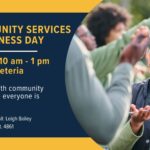Dr. Wendy Payne is the technology program coordinator for the IT & Technology Management programs at Gulf Coast State College. She had an impressive management career in the technology industry overseeing multimillion dollar projects before being a professor and program manager.
The following consists of a few highlights from my interview, which have been condensed and edited slightly to fit this post. The full interview can be watch in the video below.
Dr. Payne’s development of the technology curriculum
What does being in charge of the program entail?
I’m responsible for all curriculum and all courses. I advise all students in the program, make sure that we meet the state regulations and requirements, and make sure that all the professors meet the credentials. So I’m in charge of the curriculum per class, the textbooks per class and the program learning outcomes.
do you work with anybody on those like decisions, Or is it pretty much on you?
The responsibility’s mine, but I work with Dr. Erica Goins and Dr. Emmanuel Hernandez who are our program managers for the other two bachelor’s degrees. There are courses that are in all three degrees, so we work on those together. For the other ones I work closely with the professors that teach those classes.
How has the program changed since it started?
We’re in our eighth year of the program now. When we first started we were really gearing the program to students that work full time, and so we had almost all of our classes 100% online. it was that way for maybe the first three years. As those students went through and graduated, we had other students that came in directly from their associates degree. Most of the time those students came right from high school, so they were not full time employed. So we started mixing our classes where we’re more of a hybrid, which meet on campus one day a week and the other “day” – instead of meeting face to face – they have an online activity.
Thoughts on Web Based Courses VS The In Class Experience
Do you feel like those hybrid classes are better than strictly online?
Yes, it’s definitely better than only online, because you do get some face time with your professors. So for those students that are maybe not as dedicated or as organized, coming to class helps them stay organized. The hybrid component again, allows you to speak with your teacher face to face instead of, you know, maybe some don’t want to come to campus for office hours, or not comfortable, you know, picking up the phone or sending an email for with with a question. So usually, they have a question that that may be burning. And so they wait until they come to class to ask them. And it gives students some flexibility with their schedule.
Do you feel like as a professor, being able to engage with your students in person has a better outcome?
Absolutely I personally prefer teaching face to face classes or hybrid classes, because I like that connection with the students. I want to know about the students, I want to learn about their background, I want them to know about me. I want them to be comfortable coming and talking to me. And you don’t get that with an online environment. For a lot of the online classes I’m fortunate because I already know a lot of the students, so they’re already comfortable coming and having those conversations with me. I’ve taught online classes where I didn’t know the students and I don’t think it makes for the best learning environment for either myself as a professor or for the student.
When I asked about the differences between lectures online compared to the in-class lecture expirience Dr. Payne had this to say:
I just don’t like lectures in general. It needs to be a more of a conversation than a lecture. It took me a while to actually have this ingrained, but those who do the work are doing the learning. So if I’m lecturing, there’s really nothing that’s active about sitting and listening. If it becomes more of a discussion, everybody involved with that discussion is going to learn more in the long run, which is why in a lot of my classes, I have the students present.
Preparing Students to Present themselves & Their Work
I know you have a lot of students who are opposed to presenting. What do you do to help them overcome that?
It’s practice. Most people are uncomfortable presenting, I can’t say that every time I go into a class, I’m completely comfortable. Sometimes the class is new, sometimes the material’s new, sometimes I’m trying something new and I’m not really sure how it’s going. I think that if people are nervous about presenting, it’s not a bad thing, because it shows that they care that and they want to do a good job. But if you practice and practice and practice and practice, you get comfortable with it.
I always make everybody stand up and either introduce themselves or introduce their partner. I’ve had students that have literally stood up and looked at their shoes the entire time, and spoke very softly at the beginning of the class. By the end of the class, they were standing up, they were asking questions, and they were presenting. I think that hopefully, that’s the environment that has been cultivated, and then they’re comfortable. I really think presenting deals with confidence. And so they gain that confidence over the semester.
Is there any advice you’d give to students on what they could do to prepare themselves for presentations outside of the curriculum?
I’ve had a couple students ask me that. There’s a local Toastmasters group, that’s that’s what they do. They are there to help people prepare to speak in public. They meet – I think it’s a once a month – and you go and you grab a random subject that have in ball, then you stand up and you give a speech on it. And you might know everything about it, you might know nothing about it. But you’re also there with all the rest of the people and they also want to get better. So they’re there to help you and support you.
That kind of goes back to what we were talking about earlier. In the classroom, I think that everybody feels that maybe that they’re competing against each other, but they’re not. They’re there to help each other. I am thrilled when everybody gets an A. There’s not a setup where five people are going to get A’s and five people are going to fail. If everybody works hard, and does the work then everybody has has the right to earn that grade.
Dr. Payne’s College Experience
So when you went to school, what did you go for?
I started off in accounting and Computer Science at the University of Maryland. Then I switched my degree to hotel restaurant management. It a huge University, so when I took up programming I was learning Kobalt with 250 people. In my accounting classes there were 750. So it was the true traditional big university class where you had a professor on a stage that was so old that they had to use overheads, you know, where they will write down the stuff by hand and project it.
So how do you feel like that learning experience compares to a smaller school like this?
I love the smaller schools a lot. Being able to go and have a conversation with every one of my students I feel that I have some gauge of where they are. Sometimes it’s too late. Sometimes after the first project and I really thought that they understood it and I find out that they didn’t – but I like this a lot better.
Students who go into tech for the wrong reasons
It seems to me, like a lot of students go into the technology fields with a kind of Hollywood idea of what it will be without any actual experience. Have you seen that?
I’ve had a lot of students go into programming because they would say they like to play games so they think they want to program them. To that my analogy would be that I love to drive my car, but I don’t want to build one.
My belief is that anybody can do anything that they want to do. If they are forced down a path that is not their passion, or what they want to do, they’re not going to do well. Whether it’s computer programming, or theater, or digital media. And it’s your future job, you’re gonna spend 10 to 12 hours a day, five-six days a week working. And if you don’t like it, your life’s going to be miserable.
Conclusion
About the Author

Samuel Lane Lourcey
Student - Spring 2018






